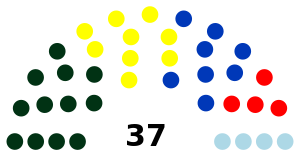Parliament of Acre
Parliament of the Islamic Emirate of Acre | |
|---|---|
| Type | |
| Type | |
| Leadership | |
Prime Minister | |
Leader of the Opposition | |
Speaker | |
| Structure | |
 | |
Political groups | Government (21):
Opposition Parties (16): |
| Elections | |
| Party-list proportional representation | |
Last election | April 2021 |
| Meeting place | |
| Parliament Palace, Paris Square, Haifa | |
The Parliament of the Islamic Emirate of Acre, more commonly referred to as the Akkan Parliament is the legislative body of the Akkan government. It is unicameral, with just one chamber of the same name. Members are elected using a party-list ballot in nationwide elections, with each member allocated a constituency proportional to an area's degree of support for their party. Thirty-seven members currently sit in Parliament, all of whom are elected.
Parliament is responsible for enacting and repealing laws. The Shura Council is able to declare a law unconstitutional, though the legislature enjoys parliamentary supremacy, allowing them to nullify the Council's decision through a second vote. By convention, bills are expected to receive the Emir's assent prior to their passing, though this is not legally required.
The Parliament is currently in its fourth sitting; the People's Democratic Union, Peace & Equality Party and Communist Party (standing together as the Joint List) form a coalition government with the Liberal Union, and have twenty-one seats out of a total of thirty-seven.
Powers
Acre's Parliament enjoys parliamentary supremacy, according to which it has absolute sovereignty and is superior to the other branches of government. Parliament is capable of overruling decisions made by the Emir, the Shura Council, or inferior legislatures, and can change and repeal any prior legislation passed by earlier sessions of Parliament. In effect, this means it is not bound by constitutional law. The Shura Council is able to declare a law unconstitutional, mandating a second reading by Parliament; if they again pass the bill, any conflicting earlier acts of Parliament are declared to be unconstitutional, and rendered null and void.
In practice, not unlike other legislatures which enjoy parliamentary supremacy, Acre's Parliament constrains itself according to the particular dynamics of the day. The assent of the Emir is traditionally sought before passing a law, and a ruling by the Shura Council is usually granted significant weight by legislators. Parliament's power often ebbs and flows based on its partisan makeup, the Emir's interest in exerting his will at any given time, and the level of support for each institution from the general public. In this way, the Emir and the Shura Council are often able to utilise soft power despite Parliament's supremacy.
Duration
Fixed terms do not exist in Acre, and Parliament is free to dissolve itself whenever it wishes to. As a matter of convention, national elections are held twice a year, though their precise dates can vary; elections can be more common if a government loses a vote of no confidence.
Composition and Seats
Parliament is composed of thirty-seven seats, and has been since its creation. There is no law binding the number of seats in Parliament, which can be increased or reduced through a normal vote. Acre uses a form of party-list proportional representation. Voters cast their ballot for a political party, with seats then allocated to parties proportionally, who choose candidates to fill their allocated seats. This form of party-list proportional representation is also used in Albania, Argentina and Israel. Additionally, members of Parliament are allocated a constituency proportional to an area's degree of support for their party.
Unlike countries such as Greece, there is no minimum vote share legally required to enter parliament, though with the current thirty-seven-seat makeup, a minimum vote share of 2.7% is needed.
Offices
Prime Minister
The Prime Minister is the head of government. Like in most other parliamentary systems, the Akkan Prime Minister is both a member of the legislature and the head of the executive branch (though the Emir also possesses some executive powers). They are chosen by a vote in the Akkan Parliament, and can be removed from office at any time by a simple majority. The Prime Minister is usually a member of the largest party, and to function effectively must be able to command a majority of the seats in the parliament. The Prime Minister heads a cabinet, delegating certain responsibilities to other ministers.
Speaker
The Speaker is responsible for most administrative affairs, tabling debates, motions, establishing committees, and holding votes. They often act as an important source of communication between the Prime Minister (and their cabinet) and the wider Parliament. Unlike most parliaments, the Speaker in Acre is partisan, retaining their party membership; they are usually a member of the government, and are elected to office by Parliament alongside the Prime Minister. Often, they are the leader of the third largest party in a coalition, if three parties are present; otherwise, they are usually a secondary figure from within the largest party.
Leader of the Opposition
The Leader of the Opposition is an honorific title bestowed on the leader of the largest oppositional party. The office does not grant its holder (nor their party) any formal privileges, though opposition leaders will often work to establish shared stances and messaging with other parties in opposition where possible, generally leading such discussions. Should the government wish to work with the opposition as a whole, this also often occurs through the leader of the opposition, though the Prime Minister is free to work with individual opposition parties through direct communications.
Sessions
| Government | Prime Minister | Official Opposition | Official Opposition Leader | Period | Image | Notes | ||
|---|---|---|---|---|---|---|---|---|
| Liberal Union | Joseph Cohen | Conservative Party | Ben Adelman | 20 February 2020 - 21 October 2020 | 
|
Minority government comprised of the Liberal Union and the Labor Zionist Party, supported through confidence and supply from the People's Democratic Union | ||
| Conservative Party | Ben Adelman | Liberal Union | Joseph Cohen | 21 October 2020 - 1 December 2020 | 
|
Minority government comprised of the Conservative Party, Labor Zionist Party and the Movement for the Homeland | ||
| Conservative Party | Ben Adelman | People's Democratic Union | Ali Kadhimi | 1 December 2020 - 1 April 2021 | 
|
Coalition government comprised of the Conservative Party, Labor Zionist Party and the Movement for the Homeland | ||
| Joint List | Ali Kadhimi | Conservative Party | Ben Adelman | 1 April 2021 - | 
|
Coalition government comprised of the Joint List and the Liberal Union | ||
Parties
Seven parties are currently represented in Parliament.
| Party Name | Logo | Leader | Ideologies | Confession | Position | Seats in Parliament |
|---|---|---|---|---|---|---|
| Liberal Union | Michelle Levin | List |
Non-confessional | Centre | 9 / 37
| |
| People's Democratic Union | 
|
Ali Kadhimi | Arab | Left | 8 / 37
| |
| Conservative Party | Ben Adelman | Israeli | Centre-right | 8 / 37
| ||
| Labor Zionist Party | Eli Barak | List |
Israeli | Centre-left | 4 / 37
| |
| Movement for the Homeland | 
|
Robert Lieberman | Israeli (Russian-speaking) | Right | 4 / 37
| |
| Peace & Equality Party | Antoun Hussein | List |
Arab (Minorities) | Centre-left | 2 / 37
| |
| Communist Party | 
|
Yusuf Kanafi | Non-confessional | Far-left | 2 / 37
|